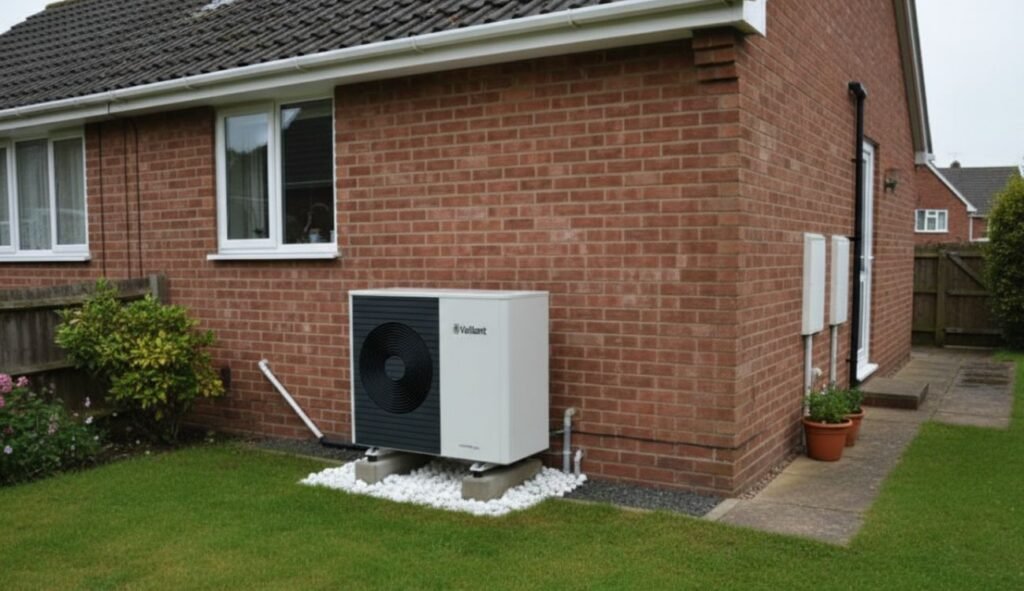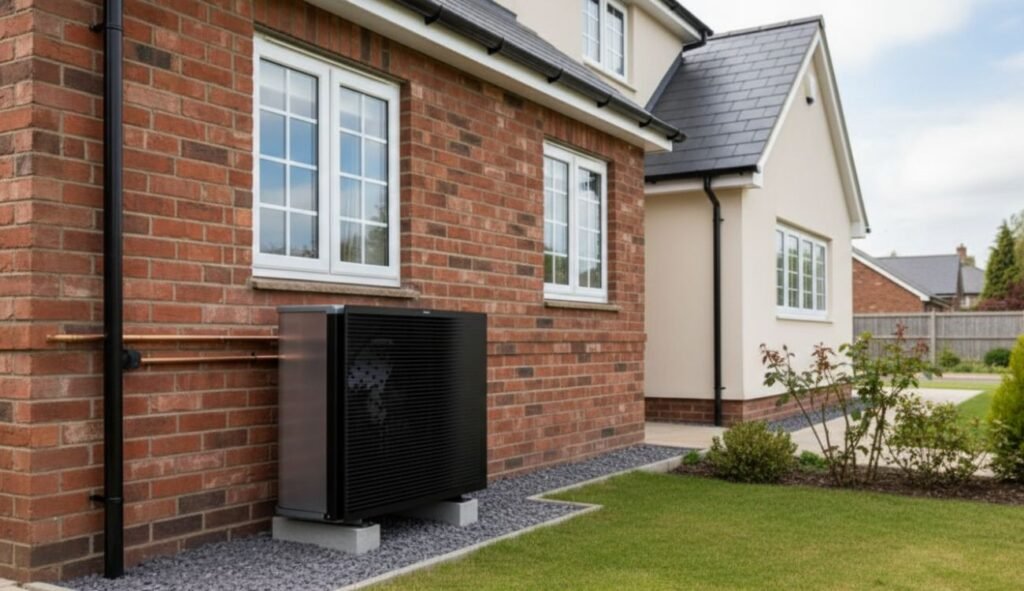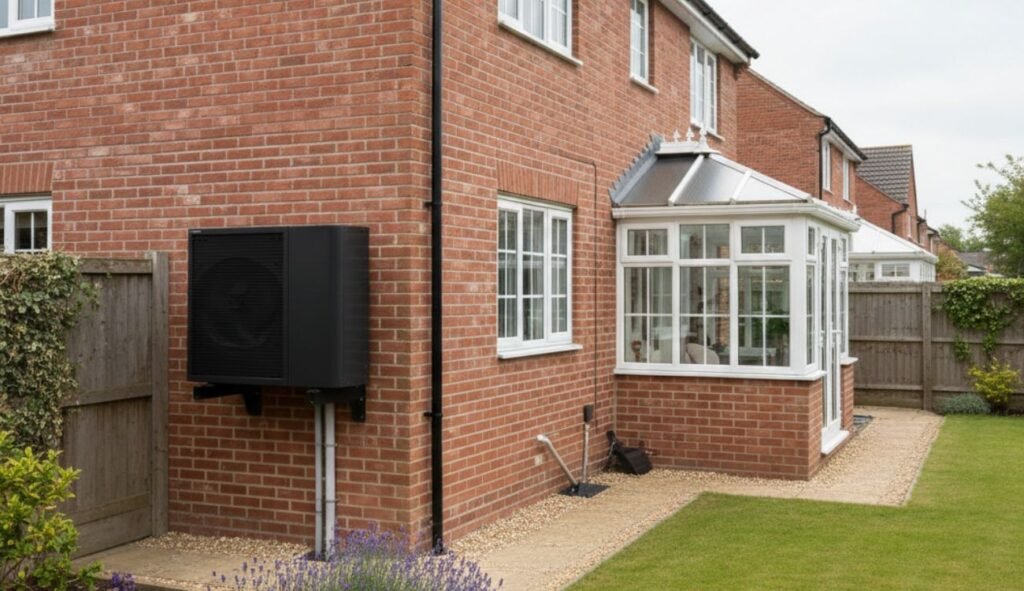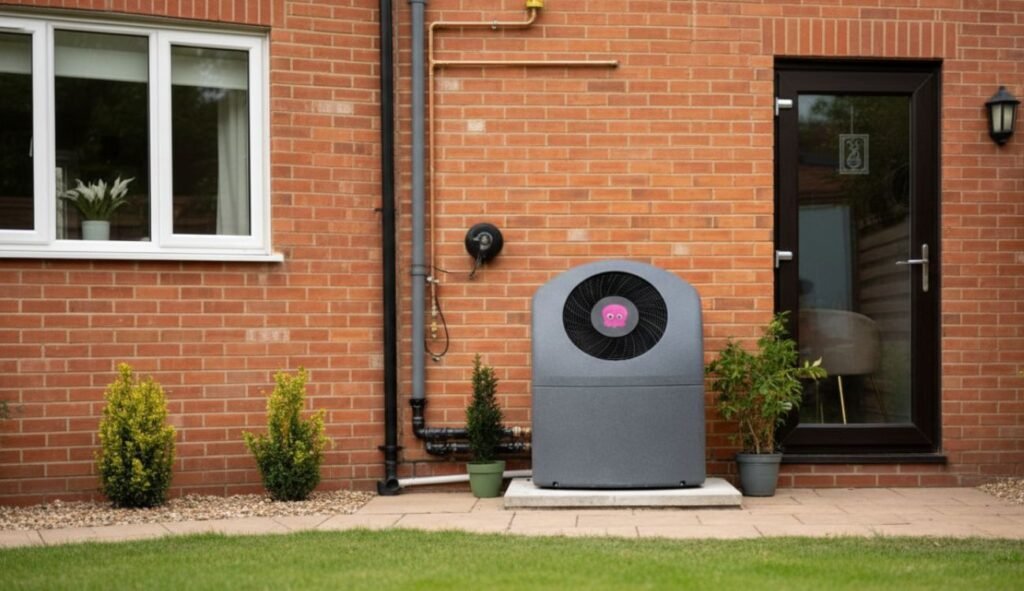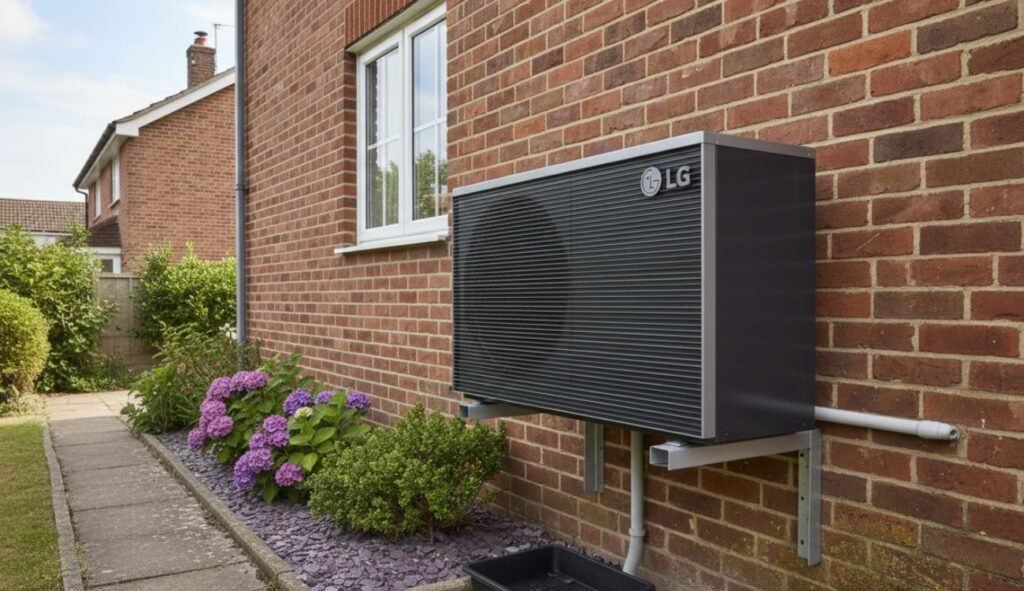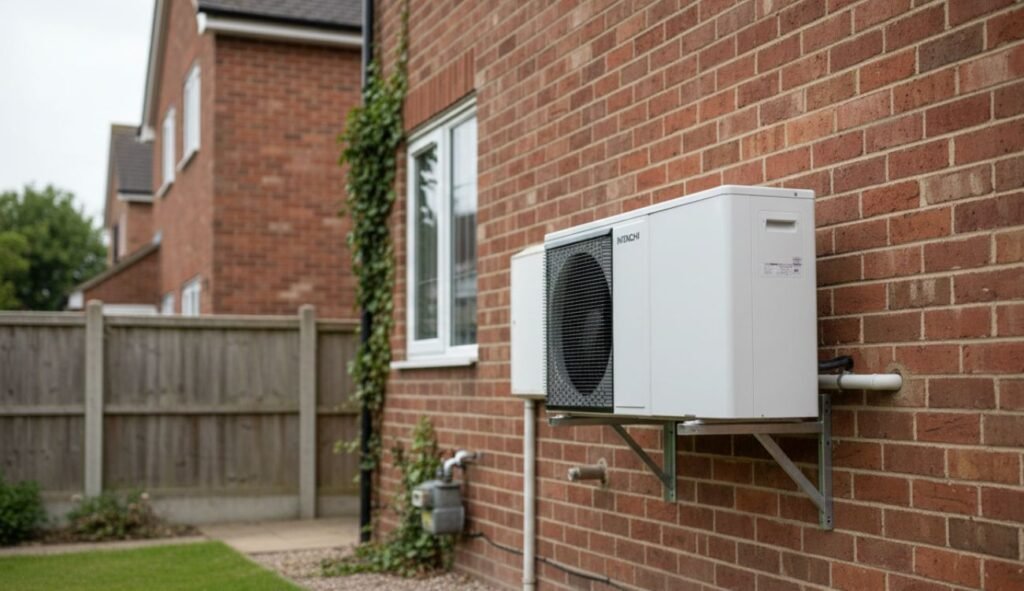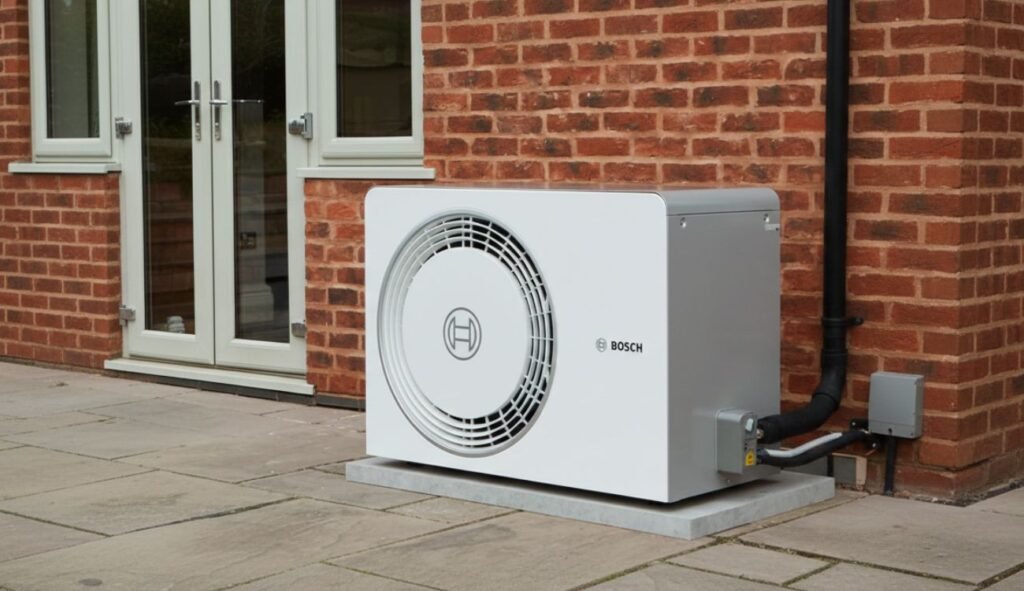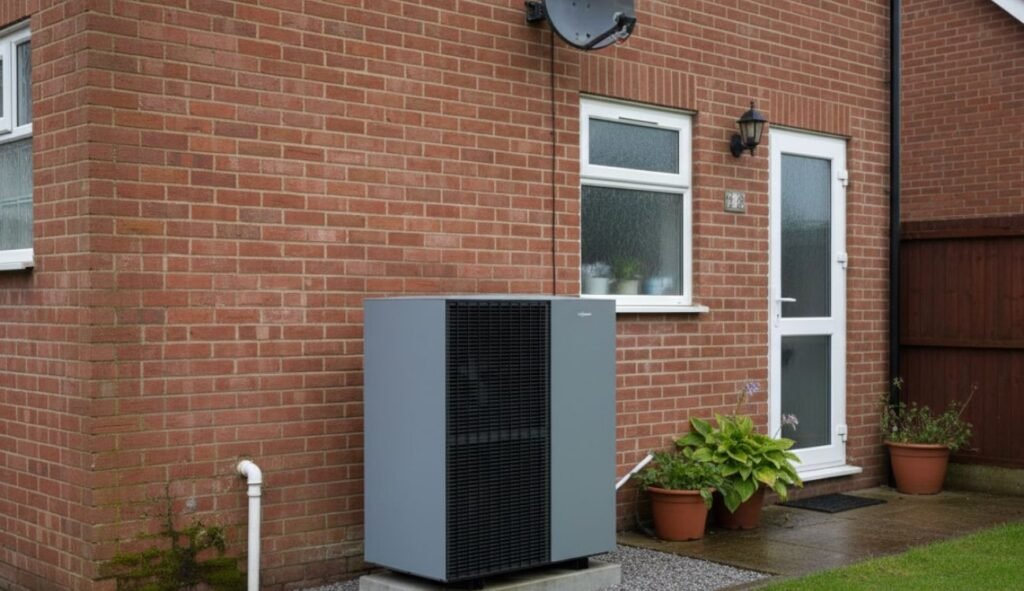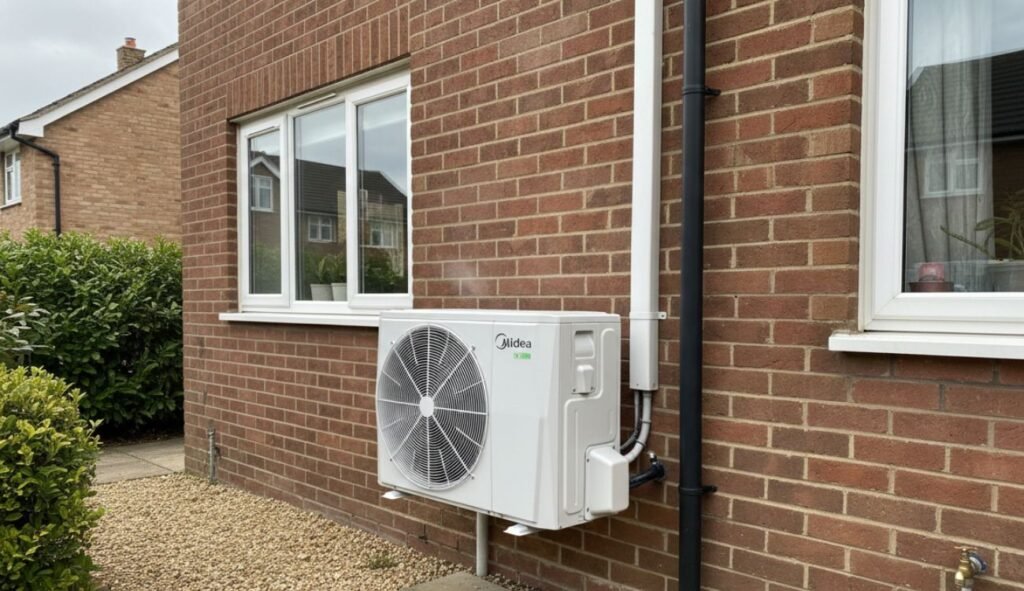If you’re a homeowner, landlord, or commercial property owner in the UK looking to invest in a heat pump, understanding the different types of heat pumps available is crucial for making an informed decision. Heat pumps are energy-efficient, low-carbon heating solutions that can significantly reduce energy bills and carbon footprints.
This guide explores the main types of heat pumps, their functionality, efficiency, suitability, costs, and more, tailored to the needs of UK properties.
Whether you’re in Tyne and Wear, Newcastle, or the wider North East of England, Future Heat offers expert air source heat pump installation services to help you transition to sustainable heating.
Request a free quote from Future Heat today at futureheatltd.co.uk to explore your options.
What Are the Main Types of Heat Pumps Available in the UK?
Heat pumps come in various forms, each designed to suit different property types and heating needs. The three primary types used in the UK are air source heat pumps (ASHPs), ground source heat pumps (GSHPs), and air-to-air heat pumps.
Below, we delve into how each type works, their efficiency, suitability, costs, planning requirements, maintenance, lifespan, and pros and cons.
Air Source Heat Pumps (ASHPs)
Air source heat pumps extract heat from the outside air to warm your home and provide hot water. They work by absorbing heat into a refrigerant fluid, which is compressed to increase its temperature, then transferred to your heating system.
How Do Air Source Heat Pumps Work?
- Heat Extraction: A fan draws outside air over a heat exchanger filled with refrigerant.
- Compression: The refrigerant is compressed, raising its temperature.
- Heat Transfer: The hot refrigerant transfers heat to water in your radiators, underfloor heating, or hot water cylinder.
- Cycle Restart: The refrigerant cools and returns to the outdoor unit to repeat the process.
According to the Energy Saving Trust, ASHPs can operate effectively even at temperatures as low as -25°C, making them viable for UK winters.
Efficiency of Air Source Heat Pumps
ASHPs typically achieve a Coefficient of Performance (CoP) of 2.5 to 4.0, meaning they produce 2.5 to 4 units of heat for every unit of electricity used. Their Seasonal Performance Factor (SPF) averages around 3.13 for a well-optimised system, per government data.
Properties Best Suited for ASHPs
- Homes with Outdoor Space: Require a clear, airy space for the outdoor unit (1m x 1m x 0.4m).
- Well-Insulated Properties: Perform best in homes with good insulation and modern radiators or underfloor heating.
- Urban and Suburban Homes: Ideal for semi-detached or detached houses in cities like Newcastle.
Costs of Air Source Heat Pumps
| Cost Type | Estimated Cost | Notes |
|---|---|---|
| Installation | £7,000–£13,000 | Includes labour and equipment; reduced by £7,500 Boiler Upgrade Scheme grant. |
| Running Costs | £234–£290 savings/year | Compared to gas boilers, per Energy Saving Trust. |
| Maintenance | £100–£200/year | Annual servicing costs. |
The Boiler Upgrade Scheme offers £7,500 to offset installation costs for homeowners and landlords in England and Wales.
Planning Permission for ASHPs
Most ASHP installations are considered permitted developments, requiring no planning permission. However, check with your local council if your property is in a conservation area or listed building, as restrictions may apply.
Maintenance of ASHPs
- Annual Servicing: Ensures efficiency and warranty validity.
- Cleaning: Wipe down coils, replace filters every few months, and clear debris around the outdoor unit.
Lifespan of ASHPs
A well-maintained ASHP lasts approximately 20 years, twice as long as a typical gas boiler, according to the Energy Saving Trust.
Pros and Cons of Air Source Heat Pumps
Pros
- Highly efficient (300–400% CoP).
- Reduces carbon emissions by up to 70.5% annually.
- Low maintenance requirements.
- Eligible for £7,500 Boiler Upgrade Scheme grant.
Cons
- High upfront costs (£7,000–£13,000).
- Less efficient in extreme cold (below -15°C).
- Requires outdoor space for the unit.
- May need insulation upgrades for optimal performance.
For a tailored solution, request a free air source heat pump quote from Future Heat.
Ground Source Heat Pumps (GSHPs)
Ground source heat pumps extract heat from the ground via pipes filled with a water-antifreeze mixture, using it to heat your home and hot water system.
How Do Ground Source Heat Pumps Work?
- Heat Collection: Pipes (ground loops or boreholes) absorb heat from the soil.
- Heat Exchange: The warmed fluid transfers heat to a refrigerant in the heat pump.
- Compression: The refrigerant is compressed to raise its temperature.
- Distribution: Heat is transferred to your heating system or hot water cylinder.
The Energy Saving Trust notes that GSHPs are more efficient than ASHPs due to stable ground temperatures (5–10°C year-round).
Efficiency of Ground Source Heat Pumps
GSHPs typically achieve a CoP of 3.5 to 4.5, with some systems reaching up to 600% efficiency in optimal conditions, making them 1.5 times more efficient than ASHPs.
Properties Best Suited for GSHPs
- Large Properties with Land: Require significant outdoor space for ground loops or boreholes.
- Rural Homes: Ideal for detached houses with gardens in areas like Tyne and Wear.
- New Builds or Renovations: Best for properties with underfloor heating or large radiators.
Costs of Ground Source Heat Pumps
| Cost Factor | Estimated Cost | Notes |
|---|---|---|
| Installation | £20,000–£45,000 | Higher for boreholes; reduced by £7,500 grant. |
| Running Costs | £450–£500 savings/year | For a four-bedroom detached home. |
| Maintenance | £150–£250/year | Includes system checks and fluid top-ups. |
Grants are available via the Boiler Upgrade Scheme.
Planning Permission for GSHPs
Most GSHP installations are permitted developments, but listed buildings or conservation areas may require approval. A thermogeological survey may be needed for boreholes.
Maintenance of GSHPs
- Annual Checks: Inspect pipework and fluid levels.
- Ground Loop Maintenance: Ensure no tree roots or obstructions interfere with loops.
Lifespan of GSHPs
GSHPs can last 20–50 years with proper care, with ground loops often lasting over 50 years, per the Energy Saving Trust.
Pros and Cons of Ground Source Heat Pumps
Pros
- Exceptional efficiency (up to 600% CoP).
- Consistent performance due to stable ground temperatures.
- Significant carbon reduction (up to 80% vs. gas boilers).
- Long lifespan (20–50 years).
Cons
- High installation costs (£20,000–£45,000).
- Requires large outdoor space.
- Disruptive installation process (digging trenches or boreholes).
- Not suitable for small properties or flats.
Are Air-to-Air Heat Pumps
Air-to-air heat pumps extract heat from the outside air and distribute it indoors via fans, primarily for heating and cooling smaller spaces.
How Do Air-to-Air Heat Pumps Work?
- Heat Absorption: An outdoor unit absorbs heat from the air into a refrigerant.
- Heat Distribution: Indoor units (wall-mounted or ducted) blow warm air into rooms.
- Cooling Option: Can reverse the process to provide air conditioning in summer.
These systems do not typically provide hot water, requiring a separate system for domestic hot water needs.
Efficiency of Air-to-Air Heat Pumps
Air-to-air heat pumps achieve a CoP of 2.5 to 3.5, slightly lower than ASHPs, but are highly effective for space heating and cooling in smaller properties.
Properties Best Suited for Air-to-Air Heat Pumps
- Flats and Small Homes: Ideal for properties without wet heating systems.
- Urban Apartments: Suitable for spaces with limited outdoor access.
- Passivhaus Designs: Work well in energy-efficient homes with ducted systems.
Costs of Air-to-Air Heat Pumps
| Cost Factor | Estimated Cost | Notes |
|---|---|---|
| Installation | £4,000–£8,000 | Lower cost due to simpler setup. |
| Running Costs | Limited UK data | Savings depend on system design and usage. |
| Maintenance | £80–£150/year | Cleaning filters and checking indoor units. |
No government grants are currently available for air-to-air systems.
Planning Permission for Air-to-Air Heat Pumps
Similar to ASHPs, most installations are permitted developments, but check local regulations for conservation areas or listed buildings.
Maintenance of Air-to-Air Heat Pumps
- Regular Cleaning: Clean filters and indoor units every few months.
- Professional Servicing: Annual checks to maintain efficiency.
Lifespan of Air-to-Air Heat Pumps
These systems last around 15–20 years with regular maintenance.
Pros and Cons of Air-to-Air Heat Pumps
Pros
- Affordable installation (£4,000–£8,000).
- Provides heating and cooling.
- Suitable for flats and small homes.
- Low maintenance requirements.
Cons
- Does not provide hot water.
- No government grants available.
- Indoor units can be noisier than other systems.
- Less data on UK performance.
How Do Heat Pump Types Compare?
| Feature | Air Source Heat Pump | Ground Source Heat Pump | Air-to-Air Heat Pump |
|---|---|---|---|
| Efficiency (CoP) | 2.5–4.0 | 3.5–6.0 | 2.5–3.5 |
| Installation Cost | £7,000–£13,000 | £20,000–£45,000 | £4,000–£8,000 |
| Annual Savings | £234–£290 | £450–£500 | Limited data |
| Best Suited For | Most homes with outdoor space | Large properties with land | Flats, small homes |
| Lifespan | ~20 years | 20–50 years | 15–20 years |
| Grant Availability | £7,500 (BUS) | £7,500 (BUS) | None |
For expert installation of air source heat pumps in Tyne and Wear, Newcastle, or the North East, Future Heat provides MCS-certified services.
What Factors Should You Consider When Choosing a Heat Pump?
- Property Size and Type: ASHPs suit most homes, GSHPs are best for large properties, and air-to-air systems fit flats.
- Budget: Air-to-air heat pumps are the most affordable, while GSHPs have the highest upfront costs.
- Insulation Levels: Well-insulated homes maximise efficiency for all heat pump types.
- Outdoor Space: GSHPs require significant land, while ASHPs need minimal outdoor space.
- Heating Needs: ASHPs and GSHPs provide hot water; air-to-air systems do not.
FAQs
Can heat pumps work with existing radiators in my home?
Yes, but larger radiators may be needed for optimal efficiency, especially with ASHPs or GSHPs, as they operate at lower temperatures than gas boilers. A professional installer can assess your system.
Are there hybrid heat pump systems available?
Hybrid systems combine a heat pump with a gas boiler, ideal for homes needing instant hot water or with high heating demands. They’re less common but can be a transitional solution.
How do heat pumps impact property value?
Installing a heat pump can improve your Energy Performance Certificate (EPC) rating, potentially increasing property value by up to 7%, according to government studies.
Can heat pumps be installed in rented properties?
Yes, landlords can install heat pumps to improve EPC ratings and meet future regulations, but tenant consent and funding eligibility (e.g., ECO4 scheme) should be considered.
What is the noise level of different heat pump types?
ASHPs and air-to-air heat pumps produce noise similar to a fridge (40–50 dB), while GSHPs are quieter as they lack outdoor units. MCS-certified units meet strict noise regulations.
Our Verdict
Choosing the right heat pump for your UK home or commercial property involves weighing efficiency, costs, and suitability. Air source heat pumps offer a versatile, cost-effective solution for most homes, while ground source heat pumps provide superior efficiency for properties with ample land.
Air-to-air heat pumps are a budget-friendly option for flats and smaller spaces, though they lack hot water provision.
With government incentives like the Boiler Upgrade Scheme and the push towards net-zero, now is an ideal time to invest in a heat pump. For residents in Tyne and Wear, Newcastle, or the North East, Future Heat’s expert installation services ensure a seamless transition to sustainable heating.
Request your free air source heat pump quote today at futureheatltd.co.uk to start saving on energy bills and reducing your carbon footprint.
Jamie Maguire is Managing Director at Future Heat Ltd, the UK-based renewable energy company specialising in heat pumps, solar panels and energy-efficient boiler solutions. He leads the company’s strategic vision to decarbonise homes and businesses across the UK by delivering innovative, sustainable heating and power systems. Jamie is passionate about shaping the future of energy, supporting communities and empowering teams of skilled engineers to deliver lasting value and carbon reductions nationwide.


